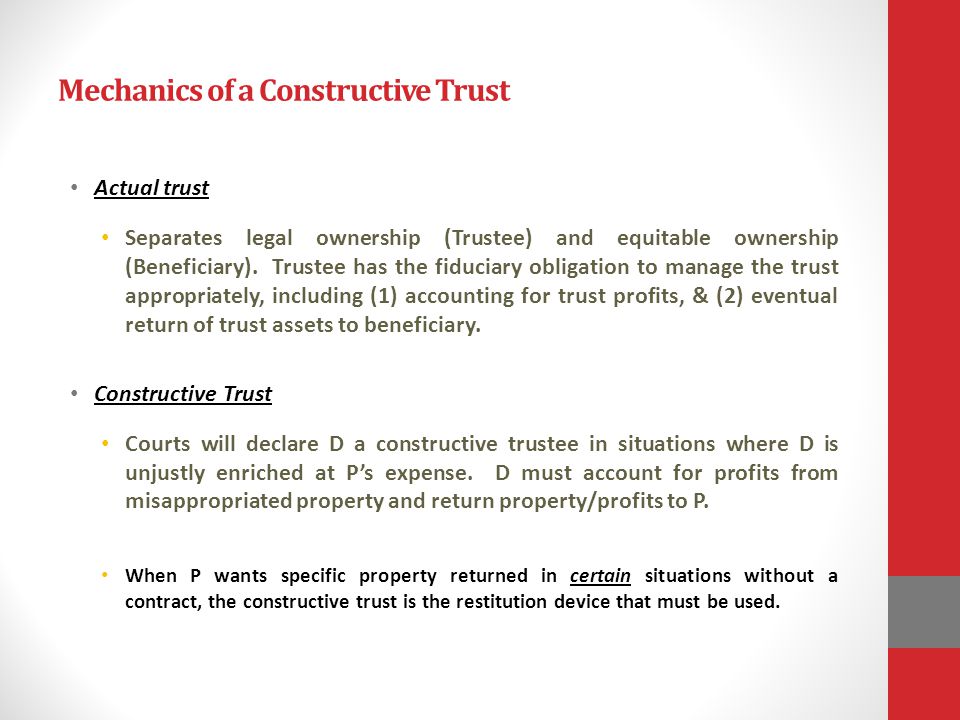Introducing the Advantages of a Useful Count On Resolving Beneficiary Problems
The idea of a positive count on becomes an essential device in the detailed world of beneficiary conflicts, using a nuanced service to conflicts that frequently develop from wrongful residential property retention. By cultivating a fiduciary relationship between celebrations, this fair treatment not just assists in speedy resolutions however likewise offers to deter possible transgression. As we explore the diverse benefits of constructive trust funds, one might start to examine how these mechanisms can reshape the landscape of estate conflicts and add to an extra fair circulation of properties amongst recipients.
Interpretation of Constructive Depend On
A constructive trust is frequently established by courts to deal with situations where one party has wrongfully obtained or kept building that truly comes from an additional (What Is A Constructive Trust). This lawful idea is not a typical trust fund, as it does not call for the formalities typically connected with trust production, such as a created arrangement or the intent of the celebrations involved. Rather, a positive trust develops by procedure of law, functioning as a fair solution to avoid unjust enrichment
The courts enforce a useful trust when it is determined that celebration holds property under conditions that, in equity and great conscience, must not permit them to preserve it. Typical scenarios entail deceptive activities, breaches of fiduciary obligation, or situations where a party has gotten residential property through inappropriate means. The positive count on hence functions to secure the rights of the rightful proprietor by ensuring that the building is held for their benefit.
When established, the useful trust fund needs the event in belongings of the building to communicate it to the rightful proprietor, thus fixing the wrongful situation. This system emphasizes the legal system's commitment to justness and justice in home disagreements, highlighting the relevance of ethical conduct in ownership and transfer of properties.
Advantages of Constructive Counts On
Useful trust funds use numerous significant benefits in legal conflicts including building rights. Mainly, they serve as an equitable remedy, permitting courts to address situations where a party has wrongfully obtained or retained home that rightfully belongs to another. This develops a structure for justness, making certain that the rightful proprietor is compensated and the unfair enrichment of the culprit is cut.
Additionally, useful counts on can speed up resolution in conflicts over estate assets, therefore lowering the often controversial and lengthy litigation procedures connected with conventional building disputes. Their adaptability permits courts to tailor treatments to fit the particular circumstances of each instance, which can result in even more satisfying end results for all celebrations entailed.
Furthermore, positive depends on advertise transparency and accountability among fiduciaries and recipients, as they need the latter to act in the very best rate of interests of the previous. This strengthens the honesty of fiduciary connections, cultivating count on and cooperation. Lastly, by inhibiting misbehavior relevant to home possession, constructive depends on add to the overall security of financial and legal systems, making certain that home civil liberties are respected and supported within culture.
Exactly How Useful Depends On Job

In method, when a useful count on is imposed, the court recognizes the property in question and establishes a fiduciary partnership in between the celebrations involved. The event that holds the home becomes a trustee, bound to manage it for the advantage of the rightful proprietor, called the beneficiary. This partnership is not based on a formal arrangement however instead on the principle of equity, intending to remedy circumstances where one event's gain straight correlates with an additional's loss.

Case Research Studies and Instances
When analyzing you can find out more the sensible application of constructive depends on, various study show just how courts navigate complicated scenarios involving unjust enrichment. One significant instance is * Pettkus v. Becker *, where the Supreme Court of copyright established a useful depend correct the unfair enrichment of one event over one more in a lasting relationship. The court figured out that the payments of one partner to the acquisition of property justified the imposition of a useful count on, making sure fair circulation.
An additional significant example is * Gisborne v. Gisborne *, where the court imposed a constructive depend deal with the insurance claims of siblings over their deceased brother's estate. The court recognized the contributions made by the siblings in preserving the family residential property, causing a choice that needed the estate to represent those contributions, thereby avoiding unjust enrichment.
These situations exemplify just how positive trust funds can successfully solve conflicts by concentrating on fairness and the avoidance of unjustified enrichment. By examining the details payments and situations of the parties entailed, courts can apply constructive depend accomplish just end results, inevitably enhancing the equitable concepts underpinning these legal mechanisms.

Steps to Develop a Useful Trust
To establish a positive count on, several vital actions should be followed to make certain that the insurance claim is validated and legally identified. First, the plaintiff should show the existence of a fiduciary partnership or a circumstance that requires the charge of a useful trust fund, such as scams, unjust enrichment, or a violation of task.
Second, it is necessary to collect and present compelling proof that sustains the insurance claim. This consists of paperwork and testimonies that illustrate the scenarios leading to the supposed wrongful retention of home or benefits by the trustee.
Third, the complaintant should submit an application in the suitable court, verbalizing the premises for asking for the charge of a constructive trust fund. This application must describe the specifics of the connection and the unjust enrichment that Visit Your URL demands the trust.
Final Thought
In conclusion, useful trust funds represent an essential fair treatment in the world of beneficiary problems, effectively attending to wrongful residential or commercial property retention and stopping unjust enrichment. Eventually, positive trusts promote justness among recipients, making certain that rightful ownership is preserved and shielded.
A constructive count on is often developed by courts to address situations where one celebration has actually wrongfully obtained or maintained residential or commercial property that rightfully belongs to one more.The courts enforce a positive trust when it is figured out that one event holds property under situations that, in equity and great conscience, ought to not allow them to maintain it. By inhibiting transgression related to home ownership, useful depends on add to the general stability of lawful and financial systems, ensuring that residential or commercial property rights are appreciated and supported within society.
In method, when a useful depend on is imposed, the court identifies this article the home in inquiry and establishes a fiduciary connection between the events entailed. What Is A Constructive Trust. The court figured out that the contributions of one partner to the procurement of building warranted the charge of a constructive depend on, making sure equitable circulation
Comments on “Understanding the Link Between What Is A Constructive Trust in Legal Proceedings”